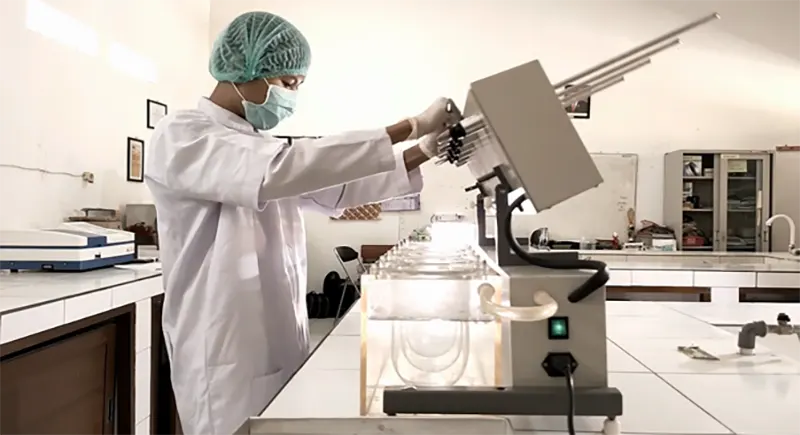The Persatuan Ahli Farmasi Indonesia (PAFI) has established rigorous competency standards for its members, ensuring that pharmacists in Indonesia are well-equipped to meet the demands of the healthcare sector. These standards encompass a wide array of knowledge, skills, and ethical considerations, reflecting the comprehensive nature of pharmaceutical practice. This article delves into the various facets of these competency standards, highlighting their significance in fostering professional excellence and safeguarding public health. pafikotarembang.org
Fundamental Knowledge and Understanding
At the core of the Persatuan Ahli Farmasi Indonesia competency standards is a solid foundation of pharmaceutical knowledge. Members are expected to possess an in-depth understanding of various scientific and clinical disciplines.
- Pharmaceutical Sciences: This includes a thorough grasp of pharmacology, medicinal chemistry, pharmacokinetics, and pharmacodynamics. Understanding these principles is crucial for the development and application of medications.
- Clinical Pharmacy: Members must be adept in clinical pharmacy practices, including the ability to interpret clinical data, manage patient medication therapies, and provide direct patient care. This ensures that pharmacists can effectively contribute to the treatment and management of diseases.
- Pharmaceutical Technology: Knowledge of drug formulation, manufacturing processes, and quality control is essential. This competency ensures that pharmacists can oversee the production of safe and effective pharmaceutical products.
Practical Skills and Application
In addition to theoretical knowledge, the Persatuan Ahli Farmasi Indonesia emphasizes the importance of practical skills that enable pharmacists to apply their knowledge in real-world settings.
- Dispensing and Compounding: Competency in accurately dispensing medications and compounding customized pharmaceutical preparations is fundamental. This skill ensures that patients receive the correct medications and dosages tailored to their specific needs.
- Medication Therapy Management: Pharmacists must be skilled in managing medication therapies, which involves assessing the appropriateness of prescribed drugs, monitoring patient outcomes, and making necessary adjustments to optimize therapeutic efficacy.
- Patient Counseling: Effective communication skills are paramount. Pharmacists need to counsel patients on the proper use of medications, potential side effects, and lifestyle modifications to enhance therapeutic outcomes.
Ethical and Professional Conduct
The Persatuan Ahli Farmasi Indonesia upholds high standards of ethical and professional conduct, ensuring that its members act with integrity and responsibility.
- Ethical Decision-Making: Pharmacists must be capable of making ethical decisions in complex situations, balancing the needs of patients, the healthcare system, and regulatory requirements. This includes maintaining patient confidentiality and obtaining informed consent.
- Professionalism: Adherence to professional codes of conduct, continuous self-improvement, and respectful collaboration with other healthcare professionals are essential traits. This fosters a trustworthy and effective healthcare environment.
- Regulatory Compliance: Understanding and complying with national and international pharmaceutical regulations is crucial. This competency ensures that pharmacists operate within legal frameworks, contributing to the safe and effective delivery of healthcare services.
Research and Innovation
The Persatuan Ahli Farmasi Indonesia recognizes the importance of research and innovation in advancing the field of pharmacy. Members are encouraged to engage in scientific inquiry and contribute to the development of new knowledge.
- Research Methodology: Proficiency in research methodologies, including the design, implementation, and analysis of studies, is essential. This competency enables pharmacists to conduct robust research that can inform clinical practice and policy.
- Innovation in Practice: Pharmacists should be capable of developing and implementing innovative solutions to improve patient care and healthcare delivery. This includes the adoption of new technologies and practices that enhance the efficiency and effectiveness of pharmaceutical services.
- Critical Appraisal: The ability to critically appraise scientific literature and evidence is vital. This skill ensures that pharmacists can base their practice on the best available evidence, thereby improving patient outcomes.
Continuing Professional Development
To maintain and enhance their competencies, members of the Persatuan Ahli Farmasi Indonesia are committed to lifelong learning and professional development.
- Continuing Education: Engaging in continuing education activities, such as attending workshops, seminars, and online courses, is essential. This ensures that pharmacists stay current with the latest advancements in pharmaceutical sciences and healthcare practices.
- Self-Assessment: Regular self-assessment and reflection on professional practice enable pharmacists to identify areas for improvement and seek appropriate development opportunities. This fosters a culture of continuous improvement and excellence.
- Mentorship and Networking: Participation in mentorship programs and professional networks provides valuable opportunities for learning and growth. By sharing knowledge and experiences, pharmacists can enhance their skills and contribute to the development of the profession.
Community and Public Health Engagement
The Persatuan Ahli Farmasi Indonesia encourages its members to engage with the community and contribute to public health initiatives.
- Health Promotion: Pharmacists play a key role in promoting health and preventing disease through public education campaigns and community outreach programs. This includes providing information on vaccination, healthy lifestyle choices, and disease prevention strategies.
- Community Service: Participation in community service projects, such as health fairs and free clinics, allows pharmacists to directly impact the health and well-being of the communities they serve. This fosters a sense of social responsibility and commitment to public health.
- Emergency Response: Pharmacists must be prepared to respond to public health emergencies, such as pandemics and natural disasters. This involves providing essential medications, supporting healthcare teams, and contributing to emergency planning and response efforts.
Future Directions and Vision
Looking ahead, the Persatuan Ahli Farmasi Indonesia is committed to evolving its competency standards to address emerging challenges and opportunities in the healthcare sector.
- Digital Competency: Embracing digital health technologies, such as telepharmacy, electronic health records, and health informatics, will be increasingly important. Pharmacists must develop digital competencies to enhance healthcare delivery and patient care.
- Interdisciplinary Collaboration: As healthcare becomes more integrated, pharmacists will need to work closely with other healthcare professionals to provide comprehensive care. Developing skills in interdisciplinary collaboration will be essential.
- Global Health Engagement: Engaging with global health initiatives and addressing international health challenges will become more prominent. Pharmacists must be prepared to contribute to global health efforts, sharing knowledge and practices across borders.
In conclusion, the competency standards set by the Persatuan Ahli Farmasi Indonesia are comprehensive and multifaceted, encompassing a broad range of knowledge, skills, and ethical considerations. By adhering to these standards, pharmacists in Indonesia are well-equipped to provide high-quality care, contribute to the advancement of pharmaceutical sciences, and enhance public health. As the healthcare landscape continues to evolve, PAFI remains committed to fostering professional excellence and ensuring that its members are prepared to meet the challenges and opportunities of the future.











